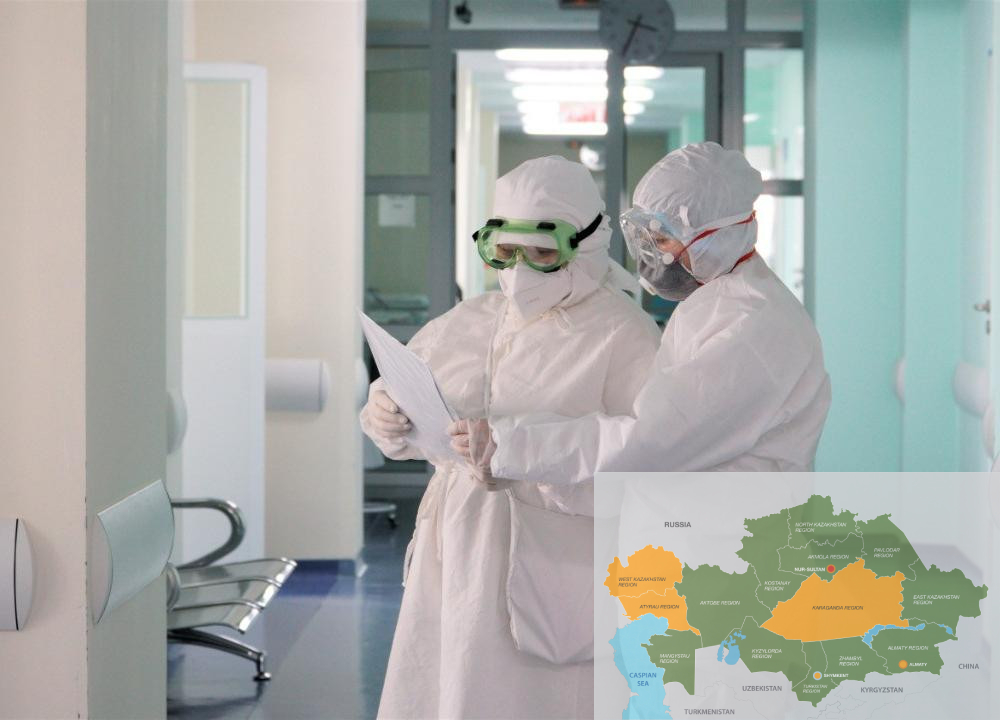NUR-SULTAN – The akimat (city administration) of Nur-Sultan confirmed that out of 54 patients in Nur-Sultan sampled for additional examination, 56 percent show the preliminary presence of the Indian COVID-19 variant, also known as the Delta variant, on June 22, reported the press service of Nur-Sultan’s akimat.

Vaccination of the general population in Kazakhstan started on Feb.2. Photo credit: Primeminister.kz. Click to see the map in full size.
The sampling of the Nur-Sultan residents also revealed that 39 percent of patients have the British variant. According to the capital’s chief sanitary doctor Sarkhat Beisenova, 80 percent of patients who tested positive with either British or Indian variant of the coronavirus are showing clinical symptoms. Some 21 patients had to be hospitalized.
Kazakh Prime Minister Askar Mamin addressed the threat of the Delta COVID variant by imploring country-wide vaccination and reinforcing border controls. “Despite the fact that the overall situation in Kazakhstan is stable, the situation in neighboring states continues to deteriorate. Therefore, it is necessary to strengthen control at the state border, as well as pay special attention to strict observance of sanitary and epidemiological standards and an increase in the rate of vaccination,” said Mamin at the government meeting on the epidemiological situation in Kazakhstan on June 22.
The Kazakh Ministry of Healthcare also urged the public to vaccinate in its official statement addressing the suspicions about the presence of the Delta variant in the country.
According to Kazakh Minister of Health Alexey Tsoy, completing the COVID-19 vaccination is the only effective way to protect yourself from the virus and hospitalization.
“Given the established circulation of the Indian variant on the territory of the country and in order to maintain a stable epidemiological situation in the regions, local executive bodies need to increase the rate of vaccination and strengthen informational and explanatory work with the population about the need for accelerated vaccination and compliance with the main preventive measures, including mask regime and social distancing,” said Tsoy.
As of today, the epidemiological situation in Kazakhstan remains stable and under control. The reproductive index of the virus equals one and the occupancy of infectious units is 25 percent, while intensive care units have reached 21 percent of their capacity.
As of June 22, there are 410,523 COVID-19 positive cases and 56,546 cases of coronavirus pneumonia. This week, Kazakhstan has moved from the green to the yellow zone, as Nur-Sultan remains in the red zone.
Five regions – the Almaty, Shymkent, West Kazakhstan, Atyrau and Karaganda regions – are in the yellow zone, while all others are in the green zone.
More than 2.8 million people in the country have been vaccinated with the first component of the vaccine against the coronavirus, which constitutes 28.4 percent of the targeted population. More than 1.7 million people have been fully vaccinated.
Akim (Mayor) of Nur-Sultan Altay Kulginov met with representatives of educational institutions, kindergartens, shopping and entertainment centers, non-governmental organizations and other large enterprises to emphasize efforts for the prevention of the coronavirus, including vaccination. Akim stated that in case of a low number of vaccinated employees, work at these facilities should be halted.
The Indian COVID-19 variant has proven to be highly contagious and 60 percent more infectious than previously detected variants. It also tends to have a shorter incubation period of up to seven days. Some consistent symptoms include severe pain in the joints and abdomen, nausea and vomiting. Recent studies show that this new variant is associated with a higher likelihood of hospitalizations and lethal outcomes.
